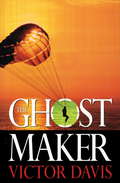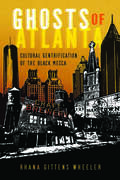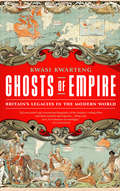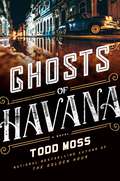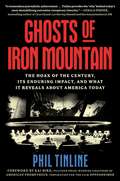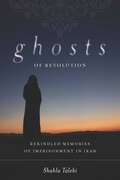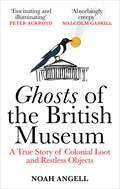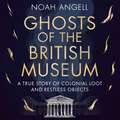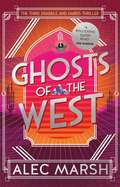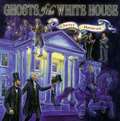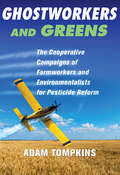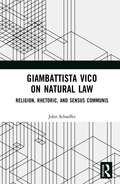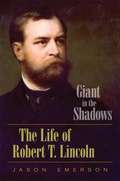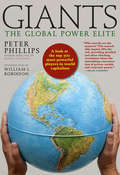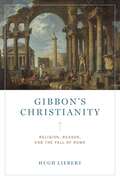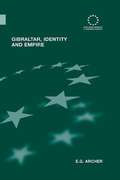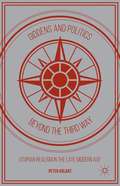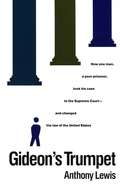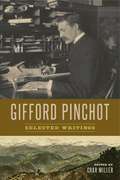- Table View
- List View
Ghostmaker
by Victor DaviesIn the great tradition of DAY OF THE JACKAL, a chillingly tense tale of assassination and betrayal.Captain Jack Boulder was his regiment's rifle champion, and runner-up for the Queen's Prize. Now, thanks to a spot of unauthorized freelance activity in Northern Ireland, he's just plain mister, running a gun club in the City.So when the spooks send him £500 in the post just for picking up the phone and listening, he listens. In spite of the ruthlessness with which the army dumped him, the notion of serving his country still means something to him, and of course it's flattering to be told that you're the only man for the job...So begins a chillingly tense adventure of assassination and betrayal, in the course of which Jack does what he does best, only to discover that the enemy is not who he had been led to believe, and that not only his life but those of his wife and sons are seriously at risk. Authentically detailed and blisteringly fast-paced, 'The Ghostmaker' is a highly accomplished debut.
Ghosts Over the Boiler: Voices from Alabama's Death Row
by Project Hope to Abolish the Death PenaltyFrom a donated typewriter that frequently breaks down, people on Alabama's death row have literally cut and pasted together a newsletter, On Wings of Hope, for the last three decades to educate the public about the death penalty. This newsletter, a labor of love, documents decades of work, wisdom, activism, and lived experience of those who have been executed, or are scheduled to be executed, by the state of Alabama. The writings also chart the changing policy and practice of capital punishment in the state that sentences more people to death per capita than any other in the US.Ghosts Over the Boiler is a curated collection of poetry, visual art, photographs, essays, creative writings, and other archival materials that have emerged from Alabama's death row from the organization Project Hope to Abolish the Death Penalty (PHADP). This group was founded at Holman Correctional Facility and has been operating autonomously since 1989 toward its mission to abolish the death penalty in Alabama and in the nation.
Ghosts of Atlanta: Cultural Gentrification of the Black Mecca
by Rhana Gittens WheelerThe Black community of Atlanta, a city once heralded as the “Black Mecca of the South,” is currently under threat of dislocation by cultural gentrification. Amid the city’s urban renaissance, residents face rising property values, taxes, and rents, as well as the more insidious loss of a collective identity and belonging. In Ghosts of Atlanta: Cultural Gentrification of the Black Mecca, author Rhana Gittens Wheeler examines the fading echoes of African American memory and historical narratives in Atlanta.As encroaching investors and business owners enter historically Black areas, many have sought to rebrand entire neighborhoods, making those spaces more palatable to would-be gentrifiers and less recognizable to former residents. Exploring material sites of meaning, including monuments, museums, art exhibitions, and more, Gittens Wheeler unearths tensions between the city’s proud legacy as a hub of political and economic equality for Black Americans and the unsettling reality of cultural displacement. Gittens Wheeler interrogates and critiques recent developments in the city, including the Atlanta BeltLine, craft breweries, and attractions that romanticize the civil rights movement.Drawing inspiration from literary giants like Ralph Ellison and Toni Morrison, as well as contemporary voices like 2 Chainz and T.I., Gittens Wheeler weaves together elements of rhetorical criticism, archival studies, and interviews to confront pressing questions. What happens when symbols of cultural memory and identity are uprooted? How do residents grapple with the erasure of their narratives, forced to feel unwelcome in their own neighborhoods? In addressing these questions, Gittens Wheeler uncovers the complex dynamics of shared spaces, exposing both the pain of displacement and the possibility of redemption.A reverberating call to action, Ghosts of Atlanta: Cultural Gentrification of the Black Mecca demonstrates that Black stories, inscribed in space, are necessary for bringing a moral reckoning to the heart of America’s national identity.
Ghosts of Empire: Britain's Legacies in the Modern World
by Kwasi KwartengKwasi Kwarteng is the child of parents whose lives were shaped as subjects of the British Empire, first in their native Ghana, then as British immigrants. He brings a unique perspective and impeccable academic credentials to a narrative history of the British Empire, one that avoids sweeping judgmental condemnation and instead sees the Empire for what it was: a series of local fiefdoms administered in varying degrees of competence or brutality by a cast of characters as outsized and eccentric as anything conjured by Gilbert and Sullivan. The truth, as Kwarteng reveals, is that there was no such thing as a model for imperial administration; instead, appointees were schooled in quirky, independent-minded individuality. As a result the Empire was the product not of a grand idea but of often chaotic individual improvisation. The idosyncracies of viceroys and soldier-diplomats who ran the colonial enterprise continues to impact the world, from Kashmir to Sudan, Baghdad to Hong Kong.
Ghosts of Havana
by Todd MossA timely international thriller by the former deputy assistant secretary of state and bestselling author. When four American sport fishermen stray into Cuban waters and are promptly arrested by Castro's navy, State Department crisis manager Judd Ryker finds himself called in to negotiate their release. But the more Ryker digs in to the situation, the more things he discovers that just don't seem to fit, especially now, with relations between the United States and Cuba supposedly thawing. Who are these men really, and what were they doing there? What is Ryker's actual mission, and what is his own government hiding from him? Some people want the new initiative to succeed. Others want to stop it at any cost. Still others see it as an opportunity for something much more radical. The common factor for every one of them: the time to act is right this minute. The ghosts of Havana are walking, and Ryker is caught in the middle of them all.
Ghosts of Havana
by Todd MossA timely international thriller by the former deputy assistant secretary of state and bestselling author. When four American sport fishermen stray into Cuban waters and are promptly arrested by Castro’s navy, State Department crisis manager Judd Ryker finds himself called in to negotiate their release. But the more Ryker digs in to the situation, the more things he discovers that just don’t seem to fit, especially now, with relations between the United States and Cuba supposedly thawing. Who are these men really, and what were they doing there? What is Ryker’s actual mission, and what is his own government hiding from him? Some people want the new initiative to succeed. Others want to stop it at any cost. Still others see it as an opportunity for something much more radical. The common factor for every one of them: the time to act is right this minute. The ghosts of Havana are walking, and Ryker is caught in the middle of them all.
Ghosts of Iron Mountain: The Hoax of the Century, Its Enduring Impact, and What It Reveals About America Today
by Phil TinlineA compelling work of investigative journalism that explores the surprising origins and hidden ramifications of an epic late 1960s hoax, perpetrated by cultural luminaries, including Victor Navasky and E.L. Doctorow. For readers curious about the surprising connections between John F. Kennedy, Oliver Stone, Timothy McVeigh, Alex Jones, and Donald Trump.Delve into the labyrinth of America&’s conspiracy culture with this investigative masterpiece that unearths the roots of our era&’s most potent myths. In 1966, amid unrest over the Vietnam War and the alarming growth of the military-industrial complex, little-known writer Leonard Lewin was approached by a group of ingenious satirists on the Left to concoct a document that would pretend to ratify everyone&’s fears that the government was deceiving the public. Devoting more than a year to the project, Lewin constructed a fiction (passed off as the honest truth) that a government-run Study Group had been charged with examining the &“cost of peace,&” setting its first meetings in the very real Iron Mountain nuclear bunker in upstate New York (which lent the resulting book, Report from Iron Mountain, its name). In Lewin&’s telling, this gathering of the nation&’s academic elite concluded that suspending war would be disastrous, forcing all sorts of bizarre measures to compensate. Lewin didn&’t realize it at the time, but he&’d created a narrative that fed the interests of both ends of the political spectrum—by promoting the idea that the government uses centralized power for evil. What fascinates about Phil Tinline&’s revelation-filled recreation of that ingenious hoax is seeing how it explodes into America&’s consciousness, dominates media reports, and sends government officials scrambling. And then, subsequently, how Lewin&’s fabrication is adopted by a seemingly endless string of extremist organizations which view it as supporting their ideology. In this riveting—and, at times, chilling—tale of a deception that refuses to die is an unsettling warning about how, in contemporary times, a hoax may no longer be a hoax if it can be used to recruit followers to a cause.
Ghosts of Revolution: Rekindled Memories of Imprisonment in Iran
by Shahla TalebiIn this powerful memoir, Talebi (religious studies, Arizona State U. ) recounts her time as a political prisoner in her homeland, Iran. First a prisoner of the Shah during his last years in power, then (for a much longer time) held in the Islamic Republic's infamous Nevin Prison, the author sacrificed a decade of her life for her political activities. Talebi shares with readers how she and other prisoners withstood their own suffering and retained hope and humanity in those dark years, often with brutal honesty. While this book will clearly have great appeal for readers interested in Iran's recent history, it also has much to say to anyone concerned with the issues of government-sanctioned torture and violence in any country. Annotation ©2011 Book News, Inc. , Portland, OR (booknews. com)
Ghosts of the British Museum: A True Story of Colonial Loot and Restless Objects
by Noah Angell'An absorbingly creepy travelogue through the corridors, tunnels and basements of our most famous cultural repository. With Noah Angell as our guide, the British Museum becomes a haunted prison filled with imperial plunder and restless spirits clamouring for attention.' - Malcolm Gaskill, author of The Ruin Of All Witches'Fascinating and illuminating' - Peter Ackroyd'Brilliantly delicate, pointed, shivery... You could read it as a guide to which galleries to avoid - or to where the push for repatriation should be most urgent.' - Erin L. Thompson, professor of art crime at the City University of New York'Achieves a near-impossible marriage between paranormal pop-culture, folklore and hauntology' - Roger Clarke, author of A Natural History of Ghosts'A heady cocktail of history and folklore that leaves a haunting aftertaste... Spine-tingling' - Lindsey Fitzharris, New York Times bestselling author of The FacemakerWhat if the British Museum isn't a carefully ordered cross section of history but is in instead a palatial trophy cabinet of colonial loot - swarming with volatile and errant spirits?When artist and writer Noah Angell first heard murmurs of ghostly sightings at the British Museum he had to find out more. What started as a trickle soon became a deluge as staff old and new - from overnight security to respected curators - brought him testimonies of their supernatural encounters.It became clear that the source of the disturbances was related to the Museum's contents - unquiet objects, holy plunder, and restless human remains protesting their enforced stay within the colonial collection's cabinets and deep underground vaults. According to those who have worked there, the institution is heaving with profound spectral disorder.Ghosts of the British Museum fuses storytelling, folklore and history, digs deep into our imperial past and unmasks the world's oldest national museum as a site of ongoing conflict, where restless objects are held against their will.It now appears that the objects are fighting back.
Ghosts of the British Museum: A True Story of Colonial Loot and Restless Objects
by Noah Angell'An absorbingly creepy travelogue through the corridors, tunnels and basements of our most famous cultural repository. With Noah Angell as our guide, the British Museum becomes a haunted prison filled with imperial plunder and restless spirits clamouring for attention.' - Malcolm Gaskill, author of The Ruin Of All Witches'Fascinating and illuminating' - Peter Ackroyd'Brilliantly delicate, pointed, shivery... You could read it as a guide to which galleries to avoid - or to where the push for repatriation should be most urgent.' - Erin L. Thompson, professor of art crime at the City University of New York'Achieves a near-impossible marriage between paranormal pop-culture, folklore and hauntology' - Roger Clarke, author of A Natural History of Ghosts'A heady cocktail of history and folklore that leaves a haunting aftertaste... Spine-tingling' - Lindsey Fitzharris, New York Times bestselling author of The FacemakerWhat if the British Museum isn't a carefully ordered cross section of history but is in instead a palatial trophy cabinet of colonial loot - swarming with volatile and errant spirits?When artist and writer Noah Angell first heard murmurs of ghostly sightings at the British Museum he had to find out more. What started as a trickle soon became a deluge as staff old and new - from overnight security to respected curators - brought him testimonies of their supernatural encounters.It became clear that the source of the disturbances was related to the Museum's contents - unquiet objects, holy plunder, and restless human remains protesting their enforced stay within the colonial collection's cabinets and deep underground vaults. According to those who have worked there, the institution is heaving with profound spectral disorder.Ghosts of the British Museum fuses storytelling, folklore and history, digs deep into our imperial past and unmasks the world's oldest national museum as a site of ongoing conflict, where restless objects are held against their will.It now appears that the objects are fighting back.
Ghosts of the British Museum: A True Story of Colonial Loot and Restless Objects
by Noah Angell'An absorbingly creepy travelogue through the corridors, tunnels and basements of our most famous cultural repository. With Noah Angell as our guide, the British Museum becomes a haunted prison filled with imperial plunder and restless spirits clamouring for attention.' - Malcolm Gaskill, author of The Ruin Of All Witches'Fascinating and illuminating' - Peter Ackroyd'Brilliantly delicate, pointed, shivery... You could read it as a guide to which galleries to avoid - or to where the push for repatriation should be most urgent.' - Erin L. Thompson, professor of art crime at the City University of New York'Achieves a near-impossible marriage between paranormal pop-culture, folklore and hauntology' - Roger Clarke, author of A Natural History of Ghosts'A heady cocktail of history and folklore that leaves a haunting aftertaste... Spine-tingling' - Lindsey Fitzharris, New York Times bestselling author of The FacemakerWhat if the British Museum isn't a carefully ordered cross section of history but is in instead a palatial trophy cabinet of colonial loot - swarming with volatile and errant spirits?When artist and writer Noah Angell first heard murmurs of ghostly sightings at the British Museum he had to find out more. What started as a trickle soon became a deluge as staff old and new - from overnight security to respected curators - brought him testimonies of their supernatural encounters.It became clear that the source of the disturbances was related to the Museum's contents - unquiet objects, holy plunder, and restless human remains protesting their enforced stay within the colonial collection's cabinets and deep underground vaults. According to those who have worked there, the institution is heaving with profound spectral disorder.Ghosts of the British Museum fuses storytelling, folklore and history, digs deep into our imperial past and unmasks the world's oldest national museum as a site of ongoing conflict, where restless objects are held against their will.It now appears that the objects are fighting back.
Ghosts of the West: Don't miss the new action-packed Drabble and Harris thriller!
by Alec MarshThis third novel in the Dabble and Harris thrillers is perfect for fans of action-packed, historical fiction.'A rollicking good read' IAN RANKINWhen daring journalist Sir Percival Harris gets wind of a curious crime in a sleepy English town, he ropes in his old friend Professor Ernest Drabble to help him investigate.The crime is a grave robbery, and as Drabble and Harris pry deeper, events take a mysterious turn when a theft at the British Museum is soon followed by a murder.The friends are soon involved in a tumultuous quest that takes them from the genteel streets of London to the wide plains of the United States. What exactly is at stake is not altogether clear - but if they don't act soon, the outcome could be a bloody conflict, one that will cross borders, continents and oceans...Meanwhile, can Drabble and Harris's friendship - which has endured near-death experiences on several continents, not to mention a boarding school duel - survive a crisis in the shape of the beautiful and enigmatic Dr Charlotte Moore?Praise for Alec Marsh's Drabble and Harris thrillers...'An immensely readable treat!'ALEXANDER MCCALL SMITH'Told with humour and flair, Enemy of the Raj is a highly enjoyable, riveting read'ABIR MUKHERJEE'A thoroughly engaging and enjoyable diversion'NEW STATESMAN on Enemy of the Raj'Tremendous stuff! With the arrival of Alec Marsh's first Drabble and Harris thriller, John Buchan must be stirring uneasily in his grave'STANLEY JOHNSON
Ghosts of the West: Don't miss the new action-packed Drabble and Harris thriller!
by Alec MarshThis third novel in the Dabble and Harris thrillers is perfect for fans of action-packed, historical fiction.'A rollicking good read' IAN RANKINWhen daring journalist Sir Percival Harris gets wind of a curious crime in a sleepy English town, he ropes in his old friend Professor Ernest Drabble to help him investigate.The crime is a grave robbery, and as Drabble and Harris pry deeper, events take a mysterious turn when a theft at the British Museum is soon followed by a murder.The friends are soon involved in a tumultuous quest that takes them from the genteel streets of London to the wide plains of the United States. What exactly is at stake is not altogether clear - but if they don't act soon, the outcome could be a bloody conflict, one that will cross borders, continents and oceans...Meanwhile, can Drabble and Harris's friendship - which has endured near-death experiences on several continents, not to mention a boarding school duel - survive a crisis in the shape of the beautiful and enigmatic Dr Charlotte Moore?Praise for Alec Marsh's Drabble and Harris thrillers...'An immensely readable treat!'ALEXANDER MCCALL SMITH'Told with humour and flair, Enemy of the Raj is a highly enjoyable, riveting read'ABIR MUKHERJEE'A thoroughly engaging and enjoyable diversion'NEW STATESMAN on Enemy of the Raj'Tremendous stuff! With the arrival of Alec Marsh's first Drabble and Harris thriller, John Buchan must be stirring uneasily in his grave'STANLEY JOHNSON
Ghosts of the White House
by Cheryl HarnessGeorge Washington's ghost pulls a girl out of her school White House tour and takes her on a personal tour of the building, introducing her to the ghosts of previous presidents and to the history of the White House and the United States.
Ghostworkers and Greens: The Cooperative Campaigns of Farmworkers and Environmentalists for Pesticide Reform
by Adam TompkinsThroughout the twentieth century, despite compelling evidence that some pesticides posed a threat to human and environmental health, growers and the USDA continued to favor agricultural chemicals over cultural and biological forms of pest control. In Ghostworkers and Greens, Adam Tompkins reveals a history of unexpected cooperation between farmworker groups and environmental organizations. Tompkins shows that the separate movements shared a common concern about the effects of pesticides on human health. This enabled bridge-builders within the disparate organizations to foster cooperative relationships around issues of mutual concern to share information, resources, and support. Nongovernmental organizations, particularly environmental organizations and farmworker groups, played a key role in pesticide reform. For nearly fifty years, these groups served as educators, communicating to the public scientific and experiential information about the adverse effects of pesticides on human health and the environment, and built support for the amendment of pesticide policies and the alteration of pesticide use practices. Their efforts led to the passage of more stringent regulations to better protect farmworkers, the public, and the environment. Environmental organizations and farmworker groups also acted as watchdogs, monitoring the activity of regulatory agencies and bringing suit when necessary to ensure that they fulfilled their responsibilities to the public. These groups served as not only lobbyists but also essential components of successful democratic governance, ensuring public participation and more effective policy implementation.
Giambattista Vico on Natural Law: Rhetoric, Religion and Sensus Communis
by John SchaefferThis book introduces the thought of Giambattista Vico (1668-1744) into the discussion about natural law. For many critics, natural law is not natural but a façade behind which lurks the supernatural – that is, revealed religion. While current notions of natural law are based on either Aristotelian/Thomistic principles or on Enlightenment rationalism, the book shows how Vico was the only natural law thinker to draw on the Roman legal tradition, rather than on Greek or Enlightenment philosophy. Specifically, the book addresses how Vico, drawing his inspiration from Roman history, incorporated both rhetoric and religion into a dynamic concept of natural law grounded in what he called the sensus communis: the entire repertoire of values, images, institutions, and even prejudices that a community takes for granted. Vico denied that natural law could ever furnish a definitive answer to moral problems in the social/public sphere. Rather he maintained that such problems had to be debated in the wider arena of the sensus communis. For Vico, as this book argues, natural law principles emerged from these debates; they did not resolve them.
Giant in the Shadows: The Life of Robert T. Lincoln
by Jason EmersonAlthough he was Abraham and Mary Lincoln’s oldest and last surviving son, the details of Robert T. Lincoln’s life are misunderstood by some and unknown to many others. Nearly half a century after the last biography about Abraham Lincoln’s son was published, historian and author Jason Emerson illuminates the life of this remarkable man and his achievements in Giant in the Shadows: The Life of Robert T. Lincoln. Emerson, after nearly ten years of research, draws upon previously unavailable materials to offer the first truly definitive biography of the famous lawyer, businessman, and statesman who, much more than merely the son of America’s most famous president, made his own indelible mark on one of the most progressive and dynamic eras in United States history. Born in a boardinghouse but passing his last days at ease on a lavish country estate, Robert Lincoln played many roles during his lifetime. As a president’s son, a Union soldier, an ambassador to Great Britain, and a U.S. secretary of war, Lincoln was indisputably a titan of his age. Much like his father, he became one of the nation’s most respected and influential men, building a successful law practice in the city of Chicago, serving shrewdly as president of the Pullman Car Company, and at one time even being considered as a candidate for the U.S. presidency. Along the way he bore witness to some of the most dramatic moments in America’s history, including Robert E. Lee’s surrender at Appomattox Courthouse; the advent of the railroad, telephone, electrical, and automobile industries; the circumstances surrounding the assassinations of three presidents of the United States; and the momentous presidential election of 1912. Giant in the Shadows also reveals Robert T. Lincoln’s complex relationships with his famous parents and includes previously unpublished insights into their personalities. Emerson reveals new details about Robert’s role as his father’s confidant during the brutal years of the Civil War and his reaction to his father’s murder; his prosecution of the thieves who attempted to steal his father’s body in 1876 and the extraordinary measures he took to ensure it would never happen again; as well as details about the painful decision to have his mother committed to a mental facility. In addition Emerson explores the relationship between Robert and his children, and exposes the actual story of his stewardship of the Lincoln legacy—including what he and his wife really destroyed and what was preserved. Emerson also delves into the true reason Robert is not buried in the Lincoln tomb in Springfield but instead was interred at Arlington National Cemetery. Meticulously researched, full of never-before-seen photographs and new insight into historical events, Giant in the Shadows is the missing chapter of the Lincoln family story. Emerson’s riveting work is more than simply a biography; it is a tale of American achievement in the Gilded Age and the endurance of the Lincoln legacy.
Giants: The Global Power Elite
by Peter PhillipsA look at the top 300 most powerful players in world capitalism, who are at the controls of our economic future.Who holds the purse strings to the majority of the world's wealth? There is a new global elite at the controls of our economic future, and here former Project Censored director and media monitoring sociologist Peter Phillips unveils for the general reader just who these players are. The book includes such power players as Mark Zuckerberg, Bill Gates, Jeff Bezos, Jamie Dimon, and Warren Buffett. As the number of men with as much wealth as half the world fell from sixty-two to just eight between January 2016 and January 2017, according to Oxfam International, fewer than 200 super-connected asset managers at only 17 asset management firms—each with well over a trillion dollars in assets under management—now represent the financial core of the world's transnational capitalist class. Members of the global power elite are the management—the facilitators—of world capitalism, the firewall protecting the capital investment, growth, and debt collection that keeps the status quo from changing. Each chapter in Giants identifies by name the members of this international club of multi-millionaires, their 17 global financial companies—and including NGOs such as the Group of Thirty and the Trilateral Commission—and their transnational military protectors, so the reader, for the first time anywhere, can identify who constitutes this network of influence, where the wealth is concentrated, how it suppresses social movements, and how it can be redistributed for maximum systemic change.
Gibbon’s Christianity: Religion, Reason, and the Fall of Rome
by Hugh LiebertThere has never been much doubt about the faith of the “infidel historian” Edward Gibbon. But for all of Gibbon’s skepticism regarding Christianity’s central doctrines, the author of The History of the Decline and Fall of the Roman Empire did not merely seek to oppose Christianity; he confronted it as a philosophical and historical puzzle. Gibbon’s Christianity tallies the results and conditions of that confrontation.Using rich correspondence, private journals, early works, and memoirs that were never completed, Hugh Liebert provides intimate access to Gibbon’s life in order to better understand his complex relationship with religion. Approaching the Decline and Fall from the context surrounding its conception, Liebert shows how Gibbon adapted explanations of the Roman republic’s rise to account for a new spiritual republic and, subsequently, the rise of modern Europe. Taken together, Liebert’s analysis of this context, including the nuance of Gibbon’s relationship to Christianity, and his readings of Gibbon’s better- and lesser-known texts suggest a historian more eager to comprehend Christianity’s worldly power than to sneer at or dismiss it.Eminently readable and wholly accessible to anyone interested in or familiar with the Decline and Fall, this groundbreaking reassessment of Gibbon’s most famous work will appeal especially to scholars of eighteenth-century studies.
Gibraltar, Identity and Empire (Routledge Advances in European Politics #33)
by E.G. ArcherThe principal argument in Gibraltar and Empire is that Gibraltarians constitute a separate and distinctive people, notwithstanding the political stance taken by the government of Spain. Various factors - environmental, ethnic, economic, political, religious, linguistic, educational and informal - are adduced to explain the emergence of a sense of community on the Rock and an attachment to the United Kingdom. A secondary argument is that the British empire has left its mark in Gibraltar in various forms - such as militarily - and for a number of reasons. Gilbraltar and Empire's exploration of the manifold reasons why the Gibraltarians have bucked the trend in the history of decolonization comes at a time when the issues in question have come to the fore in diplomatic and political areas.
Gibraltar: British or Spanish? (Routledge Advances in European Politics #Vol. 19)
by Peter GoldThe year 2004 marks three hundred years since Britain took possession of Gibraltar, a rocky promontory at the foot of the Iberian Peninsula sometimes referred to as 'The Rock'. Gibraltar: British or Spanish? provides a detailed study of the attempts that have been made by Spain, especially since 1984 when Britain and Spain signed an agreement to discuss the future of Gibraltar, to regain the sovereignty of 'The Rock', despite the wishes of the Gibraltarians.
Gibt es ein Recht auf Gemeinwohl?: Öffentliche Interessen im Blickwinkel von Rechts- und Politikwissenschaft (essentials)
by Christoph StrünckPolitikwissenschaftliche Pluralismustheorien betrachten Gemeinwohl als Resultat politischer Kompromisse. Solche prozeduralen Konzepte finden sich auch in der Rechtswissenschaft, wenn es darum geht, allgemeinen und schwachen Interessengruppen besondere Klagerechte einzuräumen. Allerdings müssen Gerichte in ihren Urteilen inhaltlich begründen, inwiefern mit solchen Klagen öffentliche Interessen gewahrt werden. Am Beispiel des Verbraucherschutzes erläutert der Autor, warum moderne Pluralismuskonzepte auch solche inhaltlichen Gemeinwohlbestimmungen in die Analyse der Interessenvermittlung einbeziehen sollten.
Giddens and Politics beyond the Third Way: Utopian Realism In The Late Modern Age
by Peter KolarzAssessing the political dimensions of Anthony Giddens' work from the 1970s to the present, this book highlights new directions for politics distinct from his Third Way. Kolarz provides an assessment of Giddens' political relevance and utility for present-day political endeavours, reflecting on the approach to critical social theory found in his early work, notably his theory of structuration and critique of historical materialism, and his consequent utopian realist analysis of late modernity. Giddens and Politics beyond the Third Way extracts from his work a rationale for global redistributive action, as well as an integrative approach to policymaking, suggesting that coherence of centre-left emancipatory politics requires coordination of policy areas previously thought of as separate.
Gideon's Trumpet
by Anthony R. LewisRecounts the true story of a prisoner who went to the supreme court in order to insure his right to legal representation.
Gifford Pinchot: Selected Writings (Pioneers Of Conservation Ser.)
by Char Miller Gifford PinchotThe founding chief of the U.S. Forest Service and twice governor of Pennsylvania, Gifford Pinchot was central to the early twentieth-century conservation movement in the United States and the political history and evolution of the Keystone State. This collection of Pinchot’s essays, articles, and letters reveals a gifted public figure whose work and thoughts on the environment, politics, society, and science remain startlingly relevant today. A learned man and admirably accessible writer, Pinchot showed keen insight on issues as wide-ranging as the rights of women and minorities, war, education, Prohibition, agricultural policy, land use, and the craft of politics. He developed galvanizing arguments against the unregulated exploitation of natural resources, made a clear case for thinking globally but acting locally, railed at the pernicious impact of corporate power on democratic life, and firmly believed that governments were obligated to enhance public health, increase economic opportunity, and sustain the land. Pinchot’s policy accomplishments—including the first clean-water legislation in Pennsylvania and the nation—speak to his effectiveness as a communicator and a politician. His observations on environmental issues were exceptionally prescient, as they anticipated the dilemmas currently confronting those who shape environmental public policy.Introduced and annotated by environmental historian Char Miller, this is the only comprehensive collection of Pinchot’s writings. Those interested in the history of conservation, the Gilded Age and Progressive Era, American politics, and the Commonwealth of Pennsylvania will find this book invaluable.
